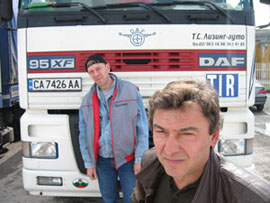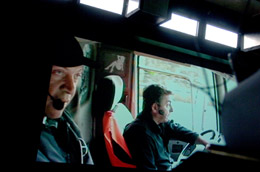Programme
Stefan Kaegi (Rimini Protokoll)
Switzerland / Germany / Int.
CARGO SOFIA - ZAGREB
11 and 12 September 2006 at 6.30pm and 9pm
departure: Old slaughterhouse Zagrepcanka, Heinzelova 66 
With: Ventzislav Borissov and Svetoslav Michev and others
Concept/Artistic Direction: Stefan Kaegi
Video: Jörg Karrenbauer
Sound: Niki Neecke
Artistic-technical support: Notker Schweikhardt
Technical support: Andreas Keßler
Production management: Bettina Land
The truck is a living spatial model. Its freight is its potential and the laboratory nature of its stage production. The truck is a converted Bulgarian truck carrying stories instead of goods.  For a crew of 2 drivers and 1-2 artists it serves as a mobile home on the one hand and as a "window" to their nomadic practices on the other.
For a crew of 2 drivers and 1-2 artists it serves as a mobile home on the one hand and as a "window" to their nomadic practices on the other.
The overhaul of the vehicle is designed to serve three alternating functions:
At night, the truck offers accommodation for 4-5 passengers and inmates. The kitchenette, the beds and the computer workstation make them feel at home in any parking lot.
In the evening, the truck is converted into a hall with a window at the lateral or the back side of the vehicle, an audio system and several spotlights outside. Where goods used to be stacked in the past, now is the audience, sitting and looking from changed perspective back to their city. Thus, the truck serves as an observatory, a theatre probe, mobile binoculars trained on the cities like a microscope.  The audience includes 30-40 people from the city visited by the truck, invited to come to a central venue - in front of a theatre, a festival hall or a museum - and transferred from there to a place typically frequented by truck drivers, such as roadside fast food restaurants, cargo handling ramps, warehouses or border checkpoints. It is amid that ready-made scenery that the drivers will be telling their stories. Cordless microphones will transfer their mobile biographies and cargo-carrying tales in a dialogue with local customs officers or motorway maintenance people. The transfer to these ready-made stages is a part of the play which unfolds at every stop which follows. On the way back, the audience will be looking in the rear-view mirror, where they'll be able to see the goods whose place they have taken. Meanwhile, the viewers will be listening to the drivers' voices coming from the driver's cab who will be telling them about the road in the first person singular while they will be looking back to their own city through the eyes of the nomads. From time to time, a screen will roll down in front of the window, in that way complementing the road with video memories from the archive.
The audience includes 30-40 people from the city visited by the truck, invited to come to a central venue - in front of a theatre, a festival hall or a museum - and transferred from there to a place typically frequented by truck drivers, such as roadside fast food restaurants, cargo handling ramps, warehouses or border checkpoints. It is amid that ready-made scenery that the drivers will be telling their stories. Cordless microphones will transfer their mobile biographies and cargo-carrying tales in a dialogue with local customs officers or motorway maintenance people. The transfer to these ready-made stages is a part of the play which unfolds at every stop which follows. On the way back, the audience will be looking in the rear-view mirror, where they'll be able to see the goods whose place they have taken. Meanwhile, the viewers will be listening to the drivers' voices coming from the driver's cab who will be telling them about the road in the first person singular while they will be looking back to their own city through the eyes of the nomads. From time to time, a screen will roll down in front of the window, in that way complementing the road with video memories from the archive.
In the daytime the truck will be converted into a mobile archive on European transport conditions. The experience gathered by the four participants during their journey will be stored in drawers, diaries, video recordings and an audio-archive - one customs after the other, one motel after the other, one performance after the other. The archive will serve as a source for the constantly changing evening performance, the en route exhibitions, as well as a film that will be made from the material collected after the first truck summer season.
Stefan Kaegi (born 1972 in Switzerland) is a theatre director who instead of staging dramas, discovers theatricality in everyday life. The approach to his subjects is documentary: what one finally sees on stage are living ready-mades or transplanted expertets in the grey-zone between reality and fiction, montages of documentary material, theatrical interventions, and real people as experts of special situations.
Stefan Kaegi studied visual arts in Zurich and performance studies at the University of Giessen, Germany. In Argentina, Brazil, Austria, and Poland he worked with local performers in urban contexts, producing motor cycle tours, audio walks, chasing channels, pet ceremonies, or bus trips. His Argentinian piece Torero Portero toured Munich (SpielArt Festival), Frankfurt (Mousonturm), and Berlin (HAU) as well as Bogotá, Rio de Janeiro, and Sao Paulo. For his paperchase 'Skrot. The Krakow Files', the cities of Frankfurt, Gießen, Munich, and Krakow became stage sets. In 2005, Stefan Kaegi's mini-train world Mnemopark was awarded the jury prize at the Festival Politik im freien Theater, Berlin - and is invited to the Avignon Festival in 2006.
In 2000, Stefan Kaegi joined forces with Helgard Haug and Daniel Wetzel in founding the theatre-label Rimini-Protokoll. Since then, they directed documentary pieces like Kreuzworträtsel Boxenstopp - whereby 80-year-old ladies were confronted with Formula 1. For the Schauspielhaus Hamburg they let a crew of funeral masters, graveyard musicians, surgery students, and gravestone producers perform Deadline. This piece got invited to the Theatertreffen (Berlin) in 2004. In Sonde Hannover, the audience could watch the city as a theatre piece through binoculars. Political furore ensued when they doubled a whole 18-hour-session of 'Bundestag' live with 200 citizens of the ex-capital Bonn in the piece Deutschland 2 at the Theater der Welt Festival (2002). In 2004, Rimini Protokoll created Sabenation for the Kunsten Festival in Brussels and Schwarzenbergplatz for the Burgtheater Vienna (nominated for the Nestroy prize, 2005). For Call Cutta they founded a call centre in Calcutta, India, that remote-controlled audiences in Berlin by mobile phone. Latest works include: "Cameriga" in Homo Novus Festival Riga (2005) and "Blaiberg und sweetheart19" for Schauspielhaus Zürich.
'In the grip of Rimini Protokoll, everything becomes both real und suspicious. No given dramaturgy ensures the difference between art and reality; it is rather the spectator who becomes a specialist in the criteria for authenticity. [.] The theatre should again become the observatory of "what's going on out there"'. (Milo Rau, Neue Zürcher Zeitung)
Throughout 2006, Kaegi will be working on projects in Berlin, Zurich, Sofia, Düsseldorf, and Sao Paulo.
Futher reading:
Talking to the Bulgarian long-distance drivers
Special thanks


Production


Co-production
![]()
![]()
![]()
![]()
![]()
Support

![]()


